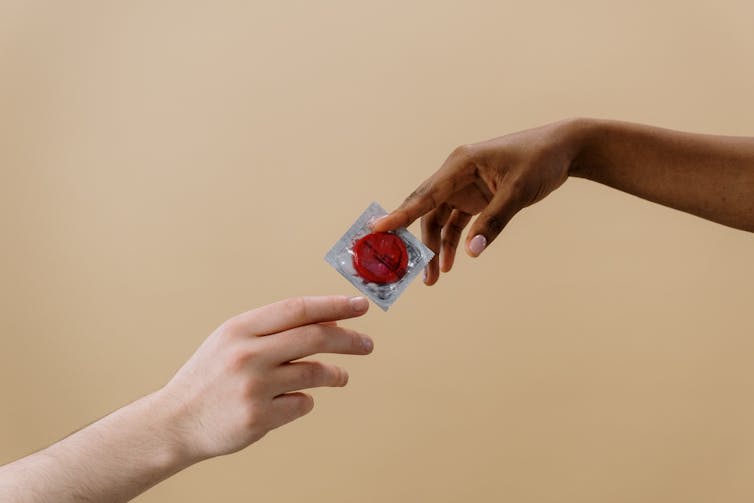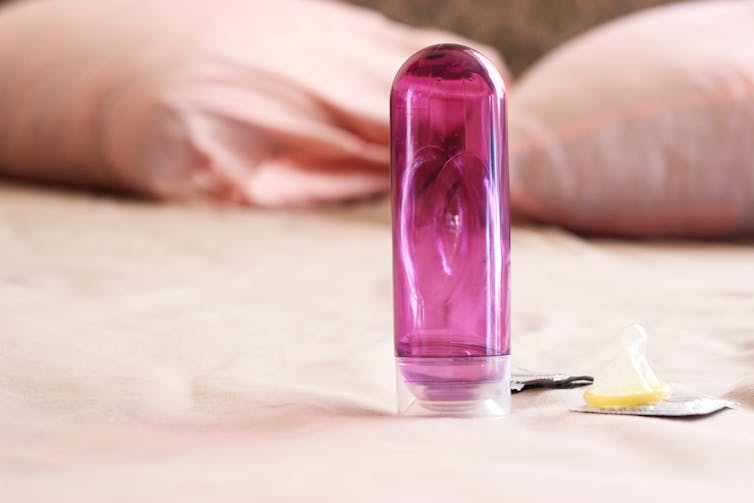Source: The Conversation (Au and NZ) – By Melissa Kang, Associate Professor, University of Sydney

Anal sex means different things to different people. A broad definition is: a sexual practice involving an object (such as a penis, finger, dildo or other sex toy) going into a person’s anus.
If you’re someone who’s interested, curious or super keen to try anal sex but are wondering whether you should have any special prep, here are a few facts and tips.
Pleasure or pain?
The skin and tissues in the genital and anal region are highly sensitive – they are packed with nerve endings that respond to touch. So touching or licking this part of the body can be very pleasurable. But like any sexual activity, the experience of pleasure is highly variable – one person’s pleasure can be someone else’s pain. What feels great once, can be very different next time.
How we experience, and enjoy or not enjoy, any sexual encounter depends on our mood, attraction, interest in sex in that moment, tiredness, relationships, the context in which sex is occurring, and many other factors.
Who’s doing it?
Anal sex between a person with a penis and a person with a vagina seems to be on the rise in Australia. In the last national survey about sex and relationships, 24.9% of men and 19.3% of women said they had had heterosexual anal intercourse (which was defined as a penis going into the anus).
This was a significant increase compared to the national survey ten years prior (20.0% of men and 15.1% of women). These findings mirrored surveys from other countries, such as the United States and the United Kingdom.
These trends may be due to increased experimentation, seeing heterosexual anal sex depicted in pornography, and more “liberal attitudes” to sexuality. It’s also possible people are just more comfortable answering “yes” to the question on surveys.
Some doctors in the UK have said there should be more medical discussion around this sexual practice, particularly with women.

Unsplash, CC BY
The low down – slow down
The anus is a very different piece of equipment compared to the vagina. It’s at the end of the anal canal, which is the 3–4cm canal between the rectum and the anus. The rectum is the final part of the large intestine.
The anal canal has two muscle sphincters, which are ring-shaped muscles. The external or outer sphincter is at the anus and is the one that you consciously relax when opening your bowels. In contrast, the vagina is a muscular, elastic tube but its opening is not controlled by a sphincter in the same way as the anus.
So, compared to the vagina, putting an object into the anal canal can take more time, as the receiving person will need to consciously relax their outer anal sphincter. It can be very helpful to start having anal sex with a fingertip, then a whole finger, and then two or three before even trying to put a penis inside.
Using a sex toy such as a small butt plug can also be a good introduction to anal sex, as they can help you get used to having a small object inside your anal canal, before moving onto bigger things.

Pexels, CC BY
No lube, no play
While the vagina has an inbuilt mechanism for self-lubrication when blood flows into the pelvis (aka “getting aroused”), the anal canal and rectum don’t.
Lubricant should be on your checklist of essentials before anal sex. The skin around the anus and the lining of the anal canal and rectum can be damaged with microtears and abrasions if there isn’t sufficient lubrication between the object being inserted and these delicate tissues.

Shutterstock
Read more:
‘Is it normal to get sore down there after sex?’
Do I need to do any other prep?
A common question or worry people have about anal sex is whether the object going into the anus will end up soiled.
The rectum is the final resting place for faeces before it goes out into the world, and once your rectum is full, you get signals from your brain to empty it. As long as you don’t have those signals, or if you’ve just emptied your bowels, there won’t be a huge amount of soiling, if any, after anal sex. Some people want to “clean out” their anal canal by using enemas or douches before anal sex. This is not necessary, since an empty rectum should be sufficient.
However, there will be invisible or small amounts of faecal matter – so hygiene after anal sex is common sense. For this reason, a golden rule of sexual play is that you don’t put an object into the anus followed by the vagina. Introducing faecal bacteria into the vagina increases the likelihood of a urinary tract infection (cystitis).
Other health considerations
Some sexual practices have higher risks of transmission of sexually transmitted infections (STIs), including HIV, and receptive anal sex (anus receiving a penis) carries the highest risk. This is because the microabrasions that can occur allow viruses and bacteria in semen to more easily enter tissues and the blood stream.
Using condoms is a highly effective way to prevent transmission. If you want to have anal sex (or vaginal sex) with a casual or new partner particularly, then having condoms and lube on hand is a no-brainer.
A recent article in the British Medical Journal drew attention to non-STI health problems that can occur with anal sex. These can include anal pain, faecal incontinence (losing control of bowels) and anal fissures. Anal fissures are small tears at the anus which can extend up towards the inner sphincter if they become more severe. They can bleed and cause pain.
So, should you do it?
Anal sex between people of any gender has been around for as long as every other sexual practice. It’s completely fine to be interested in trying it, and it’s also completely fine to feel the opposite way.
Good communication between partners before, during and after sex – about what you each want, what you’re enjoying and not enjoying, and how you feel afterwards, make for a healthier sex life. The additional things to consider with anal sex are a part of caring for yourself and your partner.
Read more:
Friday essay: shifting identities – performing sexual selves on social media
![]()
Melissa Kang does not work for, consult, own shares in or receive funding from any company or organisation that would benefit from this article, and has disclosed no relevant affiliations beyond their academic appointment.
– ref. Anal sex attitudes have changed for hetero partners – what to know before you try it – https://theconversation.com/anal-sex-attitudes-have-changed-for-hetero-partners-what-to-know-before-you-try-it-190066







